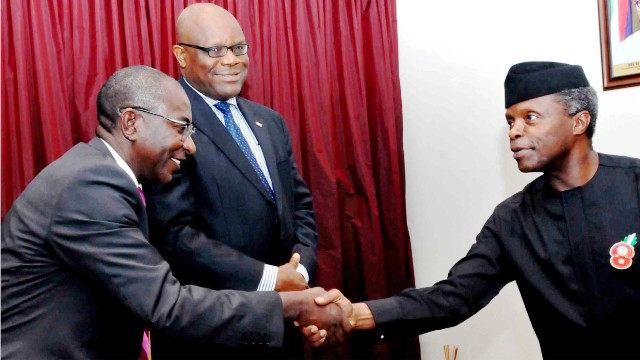Business
Oil Projects Data Ready In Two Weeks – Board

The Nigerian Content Development and Monitoring Board (NCDMB) on Monday said the outlook of upcoming activities across the upstream, midstream, and downstream sectors of the Nigerian oil and gas industry would be out in two weeks
According to a statement by Obinna Ezeobi, the Media Relations Supervisor, NCDMB, in Lagos, the compilation is the key outcome of the Nigerian Oil and Gas Opportunity Fair (NOGOF) concluded on March 31, in Uyo.
It stated that the theme was “Advancing Indigenous Participation in the Nigerian Oil and Gas Industry for National Development”.
“The compendium of opportunities will guide international and local service companies in making strategic investment plans, with a view to maximize the domestication of activities and enhance in-country value retention.
“It will also assist the NCDMB to identify high impact activities with potential for employment generation, training, in-country value addition and revenue retention for support and inclusion in its five-year roadmap.
“This will further cement the sustainability of Nigerian Content Development and implementation,” it stated.
The Executive Secretary of NCDMB, Mr Simbi Wabote, said that the board and industry had made giant strides, especially with respect to developing capacity in-country, upgrade of existing facilities and establishment of new facilities.
Wabote, however, said there had not been an alignment of the capacity being established with the demand and opportunities available.
According to him, instead, companies and investors often acquire assets and facilities to pursue short term opportunities based on trends they see in the industry.
“The regret had resulted in over capacity in some areas where in-country facilities scrambled for available work while there was lack of capacity in some other areas, resulting in exporting of work scopes abroad with the attendant loss of revenue and jobs.”
The objectives of NOGOF include showcasing opportunities in the upstream, midstream, and downstream sectors of the oil and gas industry.
“Present available and planned capacity in-country provide multi-nationals the opportunities to link up and utilise in-country.
“It enables Nigerian companies to tailor their business strategies towards exploiting available opportunities” he said in the statement.
He said that the board had adopted a 100-day target for completing its aspects of the contracting processes in line with the six months contracting cycle time set out by the Minister of State for Petroleum Resources.
Wabote said that recent assessment visits to oil and gas facilities and assets around the country had provided the board’s management with updated knowledge about the scale and size of capacities and capabilities available in-country as well as plans of some service providers to scale up their capacities.
“Similarly, all in-country capacity must be exhausted before approval will be given for procurement of Line-Pipes outside the country.”
The statement said that the Minister of State for Petroleum Resources, Dr Ibe Kachikwu, highlighted the importance of the fair, adding that the outcome would enable service companies in the industry to choose areas of specialisation and prevent overcrowding in certain fields.
According to him, “The greatest problem of the Nigerian space is overcrowding.
Kachikwu also underscored the importance of security to the development of local content and reported effort made to mobilise support around the country for peace initiatives in the Niger Delta, which had started yielding positive results.
Gov. Udom Emmanuel of Akwa Ibom stressed the need for deliberate efforts by government and oil companies to boost local capacity in the industry and enhance security.
According to him, “We have paid lip service to the issue of capacity building over the years.
“We need to transfer technology by building skills development centres in the region.”
The^Chairman, House of Representatives Committee on Local Content, Mr Emmanuel Ekon, commended the board for organising the fair.
He said it was the first time operating companies would inform service companies of projects to expect.
Ekon advised service companies to make good use of the opportunities, stressing that Nigerian Content was for companies that had built capacity and ready to deliver value.
Business
Fidelity Bank To Empower Women With Sustainable Entrepreneurship Skills, HAP2.0
Business
President Tinubu Approves Extension Ban On Raw Shea Nut Export
Business
Crisis Response: EU-project Delivers New Vet. Clinic To Katsina Govt.
-

 News2 days ago
News2 days agoAmend Constitution To Accommodate State Police, Tinubu Tells Senators
-

 Politics2 days ago
Politics2 days agoSenate Urges Tinubu To Sack CAC Boss
-

 News2 days ago
News2 days agoDisu Takes Over As New IGP …Declares Total War On Corruption, Impunity
-
Business2 days ago
President Tinubu Extends Raw Shea Nuts Export Ban To 2027
-
Business2 days ago
Crisis Response: EU-project Delivers New Vet. Clinic To Katsina Govt.
-
Business2 days ago
President Tinubu Approves Extension Ban On Raw Shea Nut Export
-
Sports2 days ago
NDG: Rivers Coach Appeal To NDDC In Talent Discovery
-
Business2 days ago
Fidelity Bank To Empower Women With Sustainable Entrepreneurship Skills, HAP2.0

